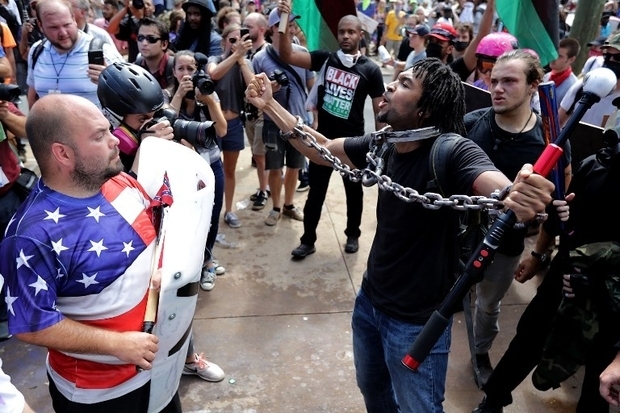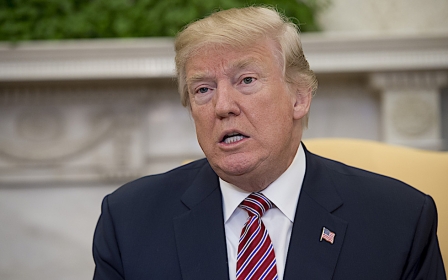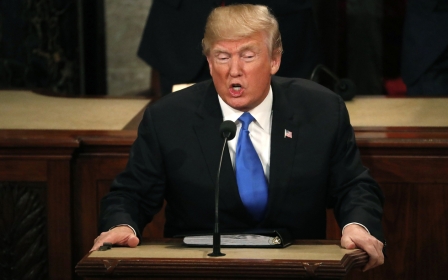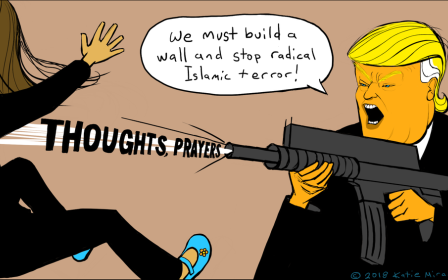Number of US anti-Muslim groups increasing under Trump, watchdog says

The number of hate groups expanded last year under President Donald Trump, with anti-Muslim organisations increasing for a third year in a row to 114 from 101 in 2016, the Southern Poverty Law Center (SPLC) said on Wednesday.
SPLC said hate groups were fuelled by Trump's immigration stance and the perception that he sympathises with those espousing white supremacy.
There were 954 hate groups in the country in 2017, marking a 4 percent increase over the previous year, the civil rights watchdog said in an annual report. Since 2014, the number has jumped 20 percent, it said.
Among the more than 600 white supremacist groups, neo-Nazi organisations rose to 121 from 99.
Dawud Walid, the Michigan executive director of the Council on American Islamic Relations (CAIR), said white nationalist groups see Muslims predominantly as people of colour.
“In their scheme of wanting to see America less melanated, Muslims are a threat just as other people of colour who are not Muslim,” he told Middle East Eye.
He added that Trump had emboldened white supremacy long before he became president when he gave prominence to the “birther” movement, claiming that Barack Obama, the country’s first black president, was born in Kenya.
As a president, Trump turned those white nationalist narratives to policy, Walid said, from the “aggressive” crackdown on undocumented immigrants to the series of Muslim ban executive orders.
Last year brought "a substantial emboldening of the radical right, and that is largely because of the actions of Trump, who's tweeted out hate materials and made light of the threats to our society posed by hate groups," Heidi Beirich, director of the SPLC’s Intelligence Project, told reporters.
Shortly after taking office in 2017, Trump's administration pulled federal funding for a group that works to rehabilitate white supremacists.
In August, Trump defended violent neo-Nazis who gathered in Charlottesville, saying there were some “very fine people” within their ranks.
Late last year, the US president caused an outcry on both sides of the Atlantic when he retweeted three fake videos to his 43 million followers, purporting to show Islamic violence. The tweets had been posted by the deputy leader of the UK fringe nationalist group Britain First.
Trump dedicated a major part of his first State of the Union yearly address to bashing immigrants and making a case against family reunification visas, which he described as “chain migration”.
The Republican president was also criticised for a string of anti-immigrant and anti-Muslim comments, including using a vulgar term to describe Haiti and African countries last month.
The Southern Poverty Law Center, founded in 1971, defines hate groups as organisations with beliefs or practices that demonise a class of people.
In the past, some groups have criticised the Alabama-based organisation's findings, with sceptics saying it has mislabeled legitimate organisations as "hate groups".
The report identified 689 groups associated with the anti-government "Patriot" movement, about 40 percent of them armed militias.
SPLC acknowledged that its report likely failed to capture the full extent of hate-group activity. It said many of them, especially from race supremacists who believe the white identity is under attack by multiculturalism, operate mainly online.
New MEE newsletter: Jerusalem Dispatch
Sign up to get the latest insights and analysis on Israel-Palestine, alongside Turkey Unpacked and other MEE newsletters
Middle East Eye delivers independent and unrivalled coverage and analysis of the Middle East, North Africa and beyond. To learn more about republishing this content and the associated fees, please fill out this form. More about MEE can be found here.




